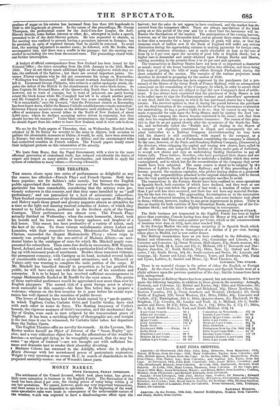THE THEATRES.
THE season closes upon two series of performances as delightful as any the season has afforded—French Plays and French Operas. Both have been popular; not for fashion's sake merely, but because the English public appreciated their merits. The success of the Brussels company in particular has been remarkable, considering that the artistes were pre- viously unknown in this country, and that they came heralded by no " puff preliminary," and not patronized by a host of aristocratic subscribers. Their finished representations of the formidable five-act operas of Meyerbeer and Halevy made those grand and gloomy pageants almost as attractive for a time as the light and dancing musical comedies of Auber ; of which they treated us to half-a-dozen, performed in the liveliest style of the Opera Comique. Their performances are almost over. The French Plays actually finished on Wednesday: when the comic humourist, Arnal, took his benefit and his leave amid the hearty applause and laughter of a full house. This season has been productive of a variety of talent, each the best of its class. To those veteran melodramatic actors Lafont and Lemaitre, with their respective heroines, Mesdemoiselles Nathalie and Clarisse, succeeded the elegant Mademoiselle Plessy ; whose reign in comedy was prolonged by the non-arrival of Madame Albert,—an acci- dental hiatus in the catalogue of stars for which Mr. Mitchell amply com- pensated his subscribers. Then came four drolls in succession, MM. Regnier, Ravel, Achard,and Arnal, each one with a particularkind of fun; thus wind- ing up with incessant peals of merriment. Besides these transient visitants, the permanent company, with Cartigny as its head, included several ladies of considerable talent as well as personal attractions; and a Rhozevil or Volnys only was wanting to complete the male portion of the corps. If Mr. Mitchell has benefited himself in proportion as he has gratified the public, he will have only met with the due reward of his exertions and enterprise. It is to be hoped he has received sufficient encouragement to engage Mademoiselle Rachel or M. Bouffd for the next season. The genius of those unrivalled performers would he appreciated now more than ever by English playgoers. The second visit of a great foreign actor is always most successful in this country—his fame flies before him to prepare a welcome; whereas on the first occasion he is gone before his exotic repu- tation has well ripened in the sunshine of public favour.
The lovers of dancing have had their beads turned by a "pas de quatre," in which Taglioni, Cerito, Carlotta Grisi, and Lucille Grahn, have vied with each other in tours de force. The floating buoyancy of Cerito's bounds, the vigorous neatness of Grisi's execution, and the mechanical faci- lity of Grahn, were each in turn eclipsed by the transcendent grace of Taglioni. It has been a ravishing display of choregraphic art; and tonight is the last time it can be witnessed, for Carlotta Grisi takes her departure from the Italian Opera. The English Theatres offer no novelty for remark. At the Lyceum, Mrs. Keeley makes herself an Object of Interest, of the " Susan Hopley " spe- cies; and a very ridiculous object too: but the affectations of the would-be heroine—a servant-girl dying to be wrongfully accused, that she may be- come " an object of interest "—are not brought out with sufficient hu- mour and dramatic tact to render their absurdity diverting.
I Madame Celeste has returned to the Adelphi, where she is playing Marie Ducange with her accustomed power of pantomimic expression. Wright is very amusing as an errant M. C. in search of shareholders in his projected assembly-rooms: one of Wrench's latest parts.


























 Previous page
Previous page